Eurovision 2019: The Ones to Watch
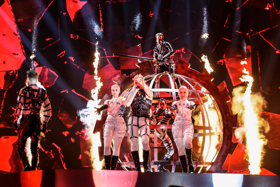
In case you don't already know, it's Eurovision time! This year, the annual song contest that brings together acts from across Europe (and beyond) is taking place in Tel Aviv in Israel.
BroadwayWorld went along to a press event in London last month to meet some of this year's contestants, and has also been keeping track of the rehearsals over the past week or so.
Here, we bring you a sneak preview of some of the songs to look out for when the contest hits screens around the world on 14, 16 and 18 May.
The 'love' songs
Of course, many of the songs in this year's contest deal with the theme of love in one way or another.
One of the standouts, and currently top in the betting odds to win the competition, is Duncan Laurence's heartfelt ballad "Arcade", representing the Netherlands in Semi-final Two on 16 May.
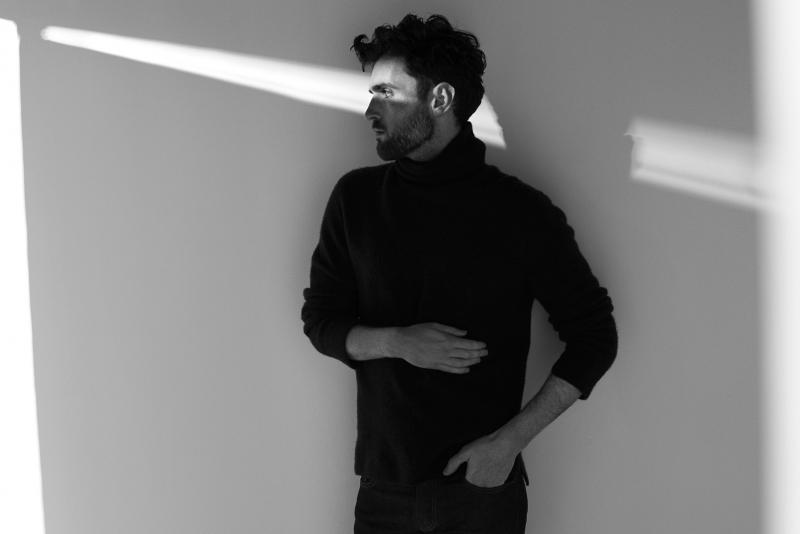
It's based on an intensely personal experience, as Duncan told BroadwayWorld: "It describes a loved one I really hope to come back, but never does. But I think it's universal, longing for someone so badly. I hope people will feel the emotion that I put in - the anger, the bitterness and everything that comes with it."
Also riding high in the betting, and also in the second semi-final, is Sweden's John Lundvik (who also wrote the UK's entry this year, trivia fans). His song asks if it's "Too Late For Love", and is a slick pop production with more than a hint of gospel.
He told us that his four formidable backing singers, whom he affectionately calls The Mammas, "make up 50% of the performance, with their energy and their singing. I don't think gospel has really been a part of Eurovision before, so it's cool to bring something new aboard!"
Greece's Katerine Duska is bringing a message of 'love is love' with her song "Better Love". She has one of the most unique voices in this year's contest, a strong song and a stage set-up that includes enough weirdness (flowers, fencers, flapping backing singers, to name just a few elements) to make her stand out in Semi-final One.
Feeling lustful?
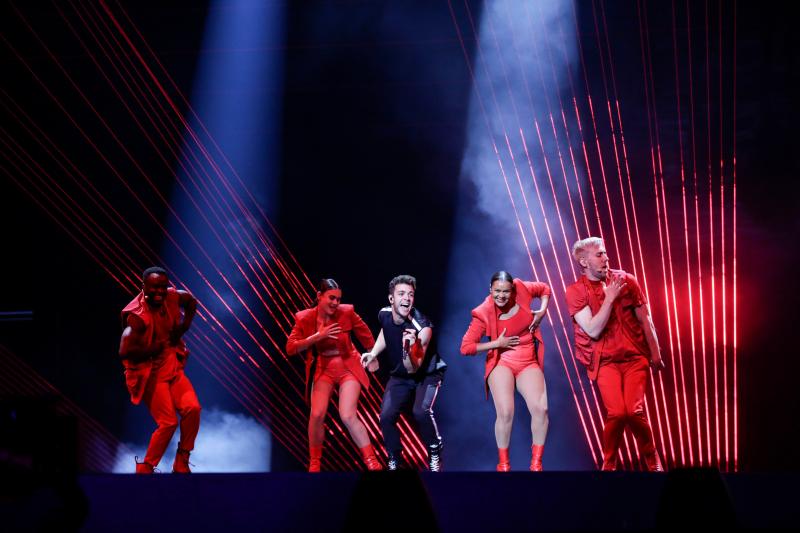
If lust is more your thing, keep an eye out for Cyprus's Tamta, who will open the first semi-final on 14 May with her song "Replay". It's an up-tempo pop number, singing about the secret desire for her that's keeping someone awake at night. Her vocals haven't been the best in rehearsals, but don't count this one out just yet.
With a similar vibe, Switzerland's Luca Hänni is singing "She Got Me" for Switzerland. He's lusting after a lady in a club who's got him 'dirty dancing'... Presumably they shied away from calling the song that in case of confusion with the movie/musical. Anyway, Luca has the voice, the looks and the moves to make an impression in Semi-final Two.
Cultural moods
Every year, a few countries step up to represent their national traditions and heritage on the Eurovision stage.
This year, Poland are showcasing their cultural roots with the folklore-influenced quartet Tulia singing "Fire of Love" ("Pali si?" in Polish) in Semi-final One. Their 'white voice' style of singing can come across as a little harsh on the ears at first, but is a specific traditional technique. The girls will also wear beautiful matching outfits inspired by traditional costume.
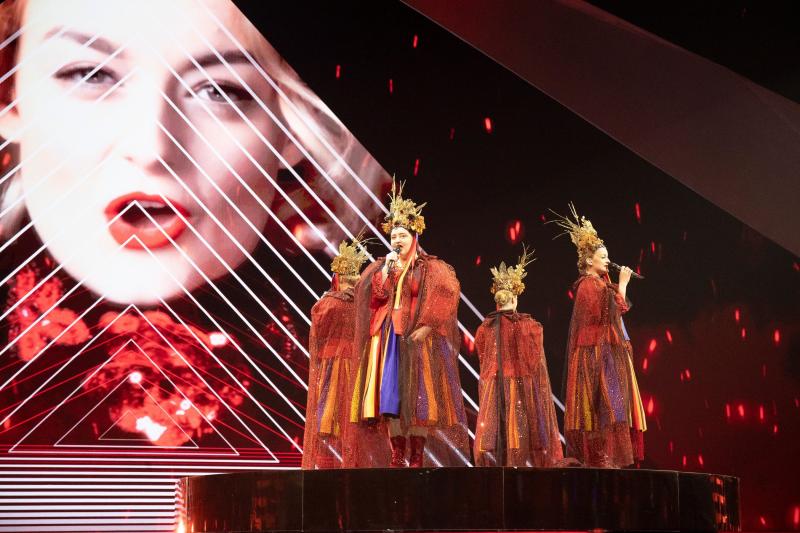
They told BroadwayWorld that representing their heritage is extremely important: "We all used to take part in shows with a folk and dance ensemble. Folk ensembles are a kind of theatre, because you're taking folklore and making it look good on stage."
Another country bringing some indigenous flavour to this year's show is Norway. Their act KEiiNO's song "Spirit in the Sky", competing in the second semi-final, features joiking, a rhythmical throat singing style practised by the Sámi people. Coupled with a strong beat, catchy chorus and Northern Lights-inspired backdrop, this could be one to watch.
Several countries are also eschewing voter-friendly English in favour of sending songs entirely in their native language. So if foreign languages are your cup of tea, as well as Poland keep an eye out for the entries from Slovenia, Hungary, Serbia, Georgia, Albania, Italy, Spain, France, Portugal and Iceland - more on a few of these later!
The 'issue' songs
Although being overtly political is against Eurovision rules, there are always some songs that come to the contest with a message.
Albania's contestant Jonidi Maliqi explained to us that her song "Ktheju Tokës" (Semi-final Two) is "about immigration, and not forgetting your roots, identity or origins. It's a global issue - maybe you can't return to your land physically, but you should never forget it."
Finland's Darude and Sebastian Rejman's song "Look Away" (Semi-final One) has lyrics that suggest we shouldn't ignore what's going on in the world today. Coupled with images of melting ice caps, it's clear that they want to deliver a topical and timely message to Europe not to forget about climate change.
.jpg)
France this year have sent Bilal Hassani with the song "Roi" (which means 'king'). Even if you don't watch the semi-finals, you'll see this one - France is one of the 'big five' countries (together with the UK, Spain, Italy and Germany) plus the host nation who always pre-qualify for the Saturday night grand final.
In London, Bilal told BroadwayWorld: "My song is about self-love, acceptance and staying true to yourself. Nowadays, through social media, other people can share their opinions about you that you haven't asked for. My song is a reminder to love yourself and not let others pollute your identity."
The song's staging will also help people to identify with this strong message - it features a talented plus-size ballerina and a deaf dancer who both ably demonstrate that if you want to do something but don't fit the normal stereotype, you shouldn't let that stand in your way.
The party numbers
Do you just see Eurovision as an excuse to party? If so don't worry, you're also well catered for this year!
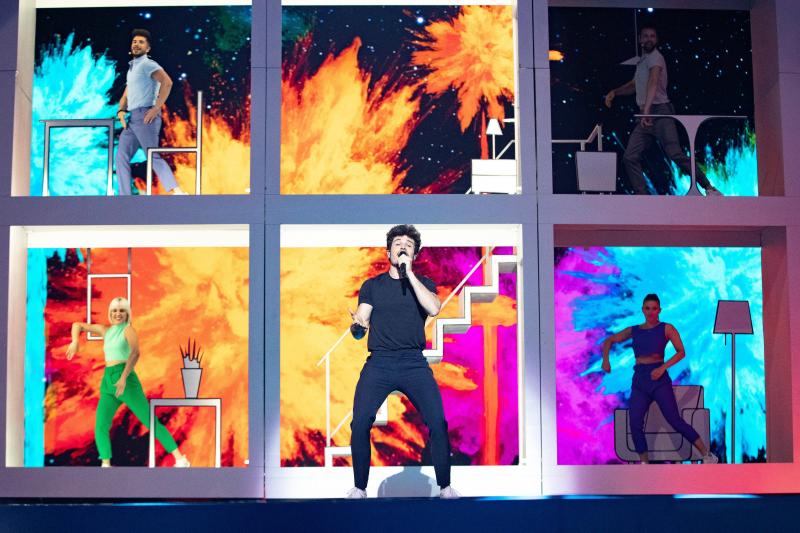
For some out and out Euro-cheese, it's San Marino to the rescue with Serhat singing "Say na na na". Its lyrics may not win a Pulitzer Prize, and its staging may not exactly be cutting edge, but if you just want to dance round your living room and have a bit of fun, this should be right up your street. Do watch the first semi-final to catch it, though - the odds currently suggest this won't qualify for the grand final.
Another of this year's party tunes comes from Spain in the form of Miki singing "La Venda" ('the blindfold'). Its BPM will ensure that you can't sit still, and the staging is an explosion of pure energy and colour. "It's a very optimistic song with a very important message, to be yourself and stop being worried about what society is telling you to be," Miki told us in London.
Musical theatre vibes
Since we're a theatre website, it's only natural for us to mention a couple of this year's Eurovision entries that have given us musical theatre vibes.
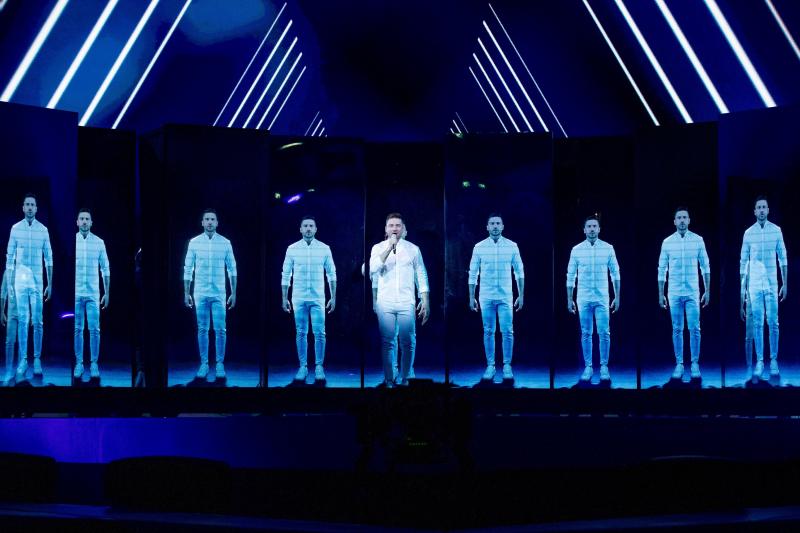
Sergey Lazarev is back representing Russia after coming third for them in 2016 with "You Are The Only One". His 2019 song "Scream" has a super-theatrical feel and great harmonies that wouldn't be out of place in the West End. Combined with some clever staging using mirrors and projections, this one should breeze through qualifying in Semi-final Two.
As the hosts this year, Israel are guaranteed a spot in the final on Saturday night. Kobi Marimi's powerful ballad "Home" could easily feature as an 11 o'clock number in a Broadway show, telling a story of taking a journey to become who you are, then returning home.
The 'crazies'
Finally, Eurovision simply wouldn't be Eurovision without a few off-the-wall entries. This year is no exception, but don't be fooled into thinking these are joke entries... they all have a serious message behind them too. (Also don't miss the first semi-final, because you'll find all of these there!)
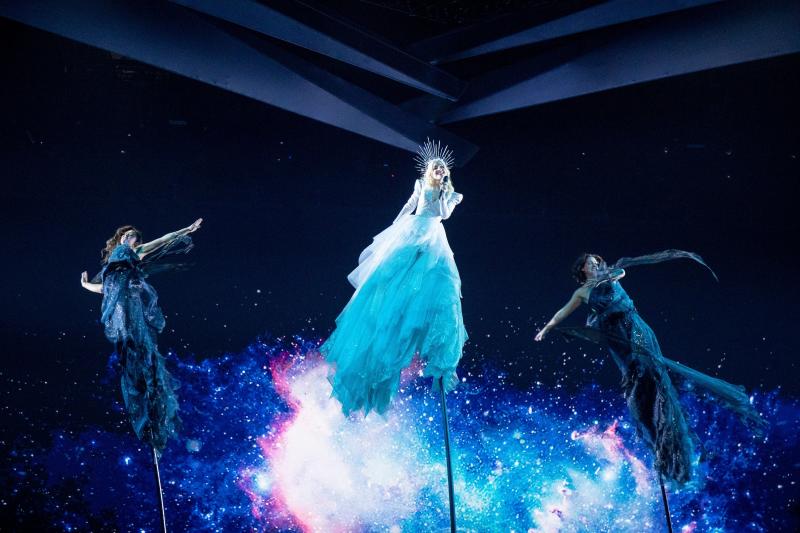
Australia have taken the staging for Kate Miller-Heidke's song "Zero Gravity" rather literally, strapping her and her two backing 'dancers' to the end of six-metre-long bendy poles and creating the illusion that they're floating in space. Somehow, Kate's pop opera vocals are still quite something...
The song was inspired by her experience with post-natal depression. "After the birth of my son, it took a couple of years for me to feel like I was regaining my strength and clarity... It was an amazing feeling and that's what this song tried to capture."
You never thought someone would write a rhythmically jarring, vocally percussive, almost tribal-sounding song about whether mobile phones could be put to better use to contact loved ones in heaven, did you? But that's exactly what Portugal's Conan Osiris has done with his song "Telemóveis" ('mobile phones').
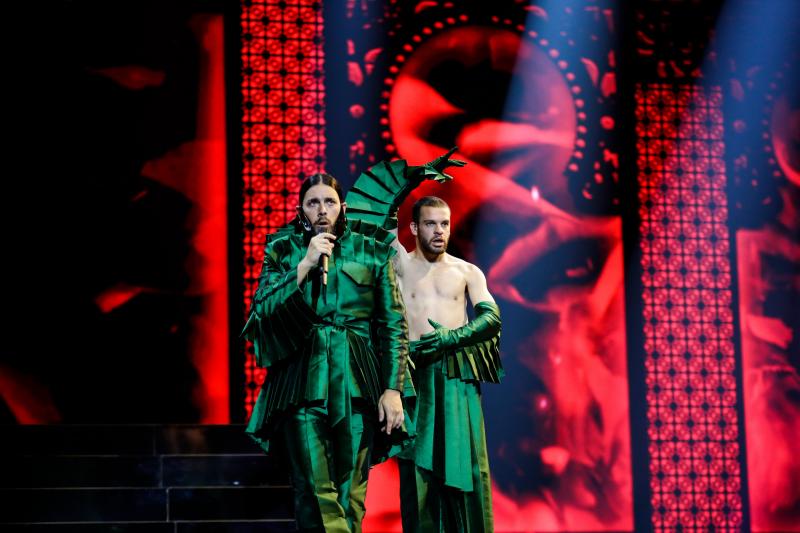
Add bold red staging, green praying mantis-inspired costumes and some extraordinary dance moves and this is 2019's most 'marmite' entry. To some it will be nonsense, to others art, but whatever your view, it's something the likes of which you'll never have heard or seen before.
Finally, we come to Iceland. What to say about Hatari and "Hatrið mun sigra" ('Hate will prevail')? Hatari brand themselves as an 'award-winning anti-capitalist performance art group'. Their song is a sort of industrial techno-dance track with vocals alternating between harsh, shouted verses and sung choruses.
Despite their song title, the message is really that if we don't remember to love each other, hate will prevail and the world will crumble. They have more pyrotechnics than you can shake a stick at, a Eurovision regulation key change... oh, and they dress in bondage gear.
God bless you, Eurovision!
The Eurovision Song Contest takes place on Tuesday 14, Thursday 16 and Saturday 18 May
Photo credits: Andres Putting, Thomas Hanses and Paul Bellaart
Comments

Videos
